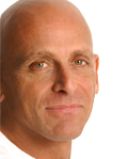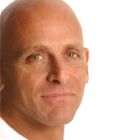Spirituality
Sacred America, Sacred World: A New Book by Stephen Dinan
The visionary CEO of The Shift Network can see light at the end of the tunnel
Posted August 5, 2016
Stephen Dinan is the founder and CEO of The Shift Network and a member of the Transformational Leadership Council and Evolutionary Leaders. The Shift Network was founded in 2010 and has served over 700,000 people worldwide, with customers in 150 countries. A graduate of Stanford University and the California Institute of Integral Studies, Dinan helped create and directed the Esalen Institute’s Center for Theory & Research, a think tank for leading scholars, researchers, and teachers to explore human potential frontiers. His powerful new book, Sacred America, Sacred World: Fulfilling Our Mission in Service to All is an eye-opening manifesto for our country’s evolution that is both political and deeply spiritual. Uplifting without being saccharine, well-informed without academic, Sacred America, Sacred World offers a hopeful vision of how America can grow beyond our current political madness and "manifest our noblest destiny," which Dinan views as being rooted in sacred principles that transcend left or right political views. Ten years in the making, this book should be required reading for anyone struggling to make sense of this country at this polarizing -- and transformational - moment.
Mark Matousek: Let's begin by talking about feminism. The Indian activist-sage Sri Aurobindo believed that, “If there is to be a future, it will wear a crown of feminine design.” At the heart of your vision for a sacred world is a renewed balance between masculine and feminine approaches to power and governance. What practical steps would you recommend for bringing this re-feminized vision into reality?
Stephen Dinan: Many of the long-term solutions I advocate are a balance of the protective, more masculine, militaristic response and the more feminine, inclusive, bridge- building response. If we were to redirect a percentage of our national defense budget to sowing seeds for more prosperity -- and gratitude -- in countries that are struggling economically struggling, it would reduce the feedbed for future terrorism.
It wasn’t that long ago that women didn’t even have the vote, and now about 20 percent of our nationally elected representatives are women. I’m a big advocate of electing more women into office and also of bringing more of the feminine to the male side, appreciating men for things like vulnerability rather than strength and dominance. Remember, hyper-masculine culture isn’t good for men either. There are high rates of suicide and illness, and men die younger than women because we’re more socially isolated and emotionally walled-off. Men and women, too, need more fluidity and less rigidity. The advance of gay marriage and gay rights is already helping create a culture in that there’s not as much binary polarization. This allows men to have a more fully developed feminine side, women to feel more balanced, and the culture to be more in flow.
When we get that flow back and forth, we move toward wholeness and are going to create the highest vision of liberty, equality ,and justice for all. The Statute of Liberty is our archetypal goddess figure with the “Give me your tired, your poor, your huddled masses yearning to breathe free.” It’s a very generous, open-arms stance, and that’s what needs to be fully integrated in our government now in order to create a whole culture.
MM: How can spirituality be brought into the arena of policy making. Not religion but a sense of the sacred? Or is that too tall an order in a competitive, capitalist society?
SD: Being in “sacred relationship” means every infusing your actions with a sense of reverence, deep respect, love and honor. That can include actual policy making. Mystical teachers worldwide have pointed to the fact that the highest states of consciousness are ones in which we experience oneness with God and with each other. There’s a deep interconnection, which science is now coming to see, increasingly, as well. When you have that sense that we’re all interconnected, it’s easier to put humane principles such as we have in the Constitution like into action.
One of our current challenges is that people on a spiritual path often feel so much dissonance when they try to get involved politically; it’s the antithesis of the love and connection we might feel in a devoted sangha, or community, of practitioners. There’s a tendency to pull back and just “hang out” in the spaces that feel better to us. But the truth is, if we abandon the public sphere to people who are operating in a less-evolved way, that’s ultimately going to hurt everyone, including us. This is the core of what Gandhi taught us in his work with the British, and what Martin Luther King demonstrated as well. A strong spiritual foundation gives us the ground out of which we can engage in a way that calls people into a higher possibility.
We still have to use our intellects and come up with good policies, but we’re more motivated to focus on the greater good when we have that ground of sacred respect and oneness. It’s not about mandating a certain set of beliefs or moral codes, but rather infusing them with love. It’s not always easy and there are many ugly, hard things to face down in America, but motivation with love at the core is what redeems and uplifts both sides in the end.
MM: What is the role of forgiveness in your vision for sacred America?
SD: That’s a great question. Often, there are unhealed wounds personal wounds underneath whatever we reject in other people. We might have been part of a minority group that’s been suppressed, marginalized, or treated badly. Something in the other – how they speak, how they look -- can trigger the unhealed wound still operating in us which then gets projected onto the other. Other times, one might feel rejected by a whole culture. Many of us who have taken on a spiritual path have had to break out of family situations or social systems that stood in opposition to raising consciousness. That can be really challenging. We’ve lived in an era where there’s a lot of violence, misunderstanding, and oppression. We can’t gloss over that and it takes a while to work that through. But ultimately, if we hang on to that trauma, it won’t serve anybody because we just see the world through that lens, rather than as it really is.
We can’t find our place of deeper humanity, and deeper shared divinity, with somebody if we’re seeing them through the lens of the trauma or the fear. You need to own the anger, frustration, heartbreak ,and devastation. You have to give space to each of the emotions and allow them to be fully lived and felt. But when we hang onto them, they poison our system and prevent us from engaging with others in way that might be uplifting. Ultimately, it doesn’t work to simply overcome and overthrow other people, or systems, or governments. We’re never going to be able to squash out racism, Islamophobia, and homophobia by force. It has to be through people evolving out of it. And that takes more love and respect than it does protest.
MM: In the book, you make the distinction between a “revolutionary” and an “evolutionary.” What is the difference?
SD: Etymologically, revolution is connected to a kind of regression. It comes from the Latin word revolvere, which means to roll back. You perpetuate rather than evolving, which is about forward momentum. Americans have gotten a bit addicted to the thrill of revolution because that’s how we were founded, but revolution also has a connotation of righteousness and lack of listening. There is a built-in polarity that tends to be impatient and it can trend into ideological or actual violence. Revolutions that turn into blood baths historically lead to more regression than progress.
Evolutionaries stand on the ground of sacred respect for others, with more patience for how cultures take time to unfold. We may want change and want it now, but it takes personal connections and trust-building, and these are things that revolution doesn’t tend to cultivate in people. An evolutionary is more like a peaceful pilgrim working with whoever is willing to play and focusing on shifting consciousness, rather than just overpowering the ones who have power at the moment. This ultimately leads to more integrated development of a society and less violence.
MM: One last question. We’re living at a cultural moment when reality has outstripped farce. Morale in this country is at an historic low, yet your book is full of hope. What is the source of your optimism?
SD: How do we choose to focus our attention? Research tells us that optimists are healthier and accomplish more; being optimistic fulfills your larger mission as well as expressing your fullness. Also, if you look at history, Martin Luther King’s statement that “the arc of history is long but it bends toward justice” is indisputably true. Personally, I’m fortunate to be able to interface with visionary people and amazing projects on a daily basis. I hear about amazing discoveries every day and allow that reality to feed my psyche. Also, I study the collective culture to see where the patterns of breakdown are. Of course, there is heartbreak when really hard things happen but I’m also aware of -- and trust -- the positive things that are emerging. Adding my voice to the mix and taking action is empowering as well; it overcomes that sense of learned helplessness—of traumatizing things on the news that you don’t feel like you can change. I’m an advocate for taking small actions that add to the good side of the equation in tough moments.
Steve Jobs said he would often ask people to do things that seemed impossible. In that asking, he would convince people it was possible. This power of consciousness shapes our reality. We need to train ourselves to focus on what’s emergent, to focus on that higher possibility. Look at what’s happening with solar power and electric car technology and public banking options and micro-finance. Bringing clean drinking water to remote villages around the world means we could end the diseases associated with unclean drinking water by 2020 if we get more motivated. Simply put, problems decline when we get better at finding solutions. I know our world has some very big challenges, but I do feel deeply optimistic that we will transform them and hopefully grow together through that transformation.




